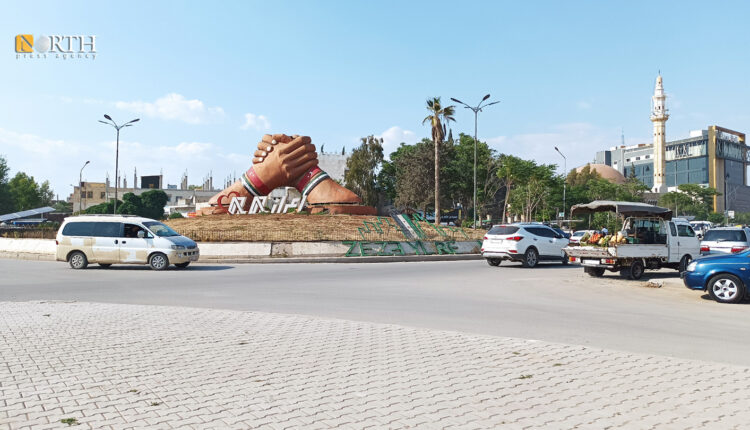
IDLIB, Syria (North Press) – Turkish authorities have arbitrarily arrested, detained, and deported hundreds of Syrian refugee living in Turkey to Syria since 2023 as part of their plan to return about a million Syrian refugees to what they called the “safe zone”.
The 32-year old Amjad al-Omar is sitting with many of his friends on the Syrian-Turkish border near the city of Salqin, north of Idlib, waiting for nightfall to start trying to sneak into Turkish territory illegally.
On the June 17, the Turkish authorities deported al-Omar to Syria after arresting him while he was on his way to his house returning from work in a factory in the Turkish city of Istanbul.
Al-Omar was deported to Aleppo Governorate despite holding a work permit and a temporary protection card (Kimlik), leaving behind his wife and four children in Istanbul with no breadwinner.
After Turkish forces and their affiliated SNA factions occupied the Kurdish city of Afrin in 2018, following a Turkish military operation dubbed ‘Olive Branch’ which displaced around 300,000 of the original inhabitants, Turkey began implementing its plan to bring about a demographic change in the area.
This was done by establishing settlements for the factions, their families, and IDPs who were forcibly deported from Turkey.
Several organizations based in Palestine, Qatar, Saudi Arabia, and Kuwait, are involved in this process that fund local associations, which sponsor the construction of these settlements. Since then, Turkey has built 112 settlements in the area in the first half of 2023.
Turkey uses local organizations and SNA factions to implement the demographic change process. It gets rid of Syrian refugees on its lands by settling them in these settlements, which are marked with the Turkish flag.
On July 24, Turkish authorities deported 140 Syrian refugees, including a pregnant woman, to areas in the Idlib Governorate in northwest Syria through the Bab al-Hawa border crossing, raising the number of deportees at the day to 200 towards northern and northwestern Syria.
Al-Omar told North Press that in 2019 he left Syria with his family and entered the Turkish territory illegally with the aim of searching for a better life for his family.
“A police patrol arrested me while I was leaving my work in Istanbul, and I was detained in the deportation center, accompanied by more than 150 people, after which they deported us to Bab al-Salama crossing, north of Aleppo,” he said.
Many of the people who were deported by the Turkish authorities resort to illegal smuggling routes to return to Turkey, especially since most of them left behind their children and families.
However, this has become very difficult recently due to the great tightening on the borders with Syria by the Turkish border guard.
Al-Omar has been trying to return to Turkey illegally more than 13 times, but all his attempts failed, in addition, he was severely beaten in each time by the Turkish border guards.
Those who want to cross to Turkey pay more than $2,000, while last year they did not exceed $800, despite this, the chance of crossing successfully is nearly impossible.
Bahaa Haj Ahmad, a pseudonym for an administrative at the Bab al-Salama border crossing with Turkey, north of Aleppo, says that the Turkish authorities deport dozens of people daily in normal circumstances, but since the beginning of this month, the daily number has become hundreds, and all of them are forcibly deported.
Haj Ahmad stresses that most of the Syrians who are being deported are from Aleppo, Hama and Damascus, and most of them do not have any relatives in northern Syria, and when they are being deported from Turkey to Syria, they do not know where to go, and until now there is no organization or government agency that takes care of them.
Forcible deportations are considered a real crime against humanity and against the Syrian people at this difficult time in northern Syria, where the region is still tense and insecure, and hardly a week is devoid of a kidnapping or bombing there.
He assumes that the villages [settlements] built by Turkish, Qatari, Kuwaiti and Palestinian support in northwestern Syria, especially in Afrin and its countryside, are for those whom Turkey calls voluntarily returning, but in reality these people did not receive a single room in any of those villages that were built.
These rooms are being handed over to members of the Turkish-backed military factions.
“If things remain in this way, the region will witness a disaster in the near future, as we may see hundreds of forcibly displaced people sleeping on the streets because they have no shelter,” Haj Ahmad said.
Abdelhakim al-Sayed, a human right activist, said that the forced deportations with voluntary-facade of Syrians from Turkey come at a very difficult time in northern Syria, which is home to more than six million people, according to the latest statistics issued by the Response Coordination Group (RCG) a few weeks ago.
The difficult circumstances are represented in the closure of the Bab al-Hawa border crossing with Turkey to aid permanently for the first time since 2011, in addition to the reduction of international aid to unprecedented records, which increased the suffering of the region. All this takes place under the name of voluntary return.
The transfer of detainees from one country to another, where they may be subjected to torture or inhuman or degrading treatment, is a clear violation of international humanitarian law and the European Convention on Human Rights. These actions underscore the urgent need for action to address the human rights abuses committed against Syrian refugees and non-Syrian nationals.
